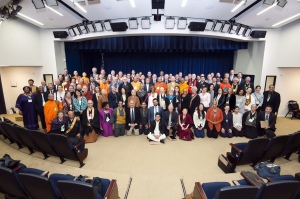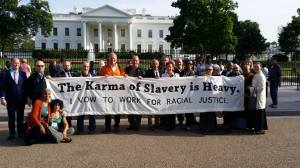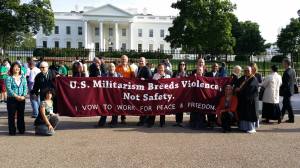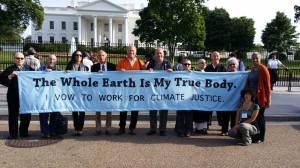Buddhists Go to the White House
Hozan Alan Senauke—16 May 2015
The streets of Washington DC were lined with blossoms and greenery, the prospect of promise. One hundred thirty Buddhist teachers, monks, nuns, laymen and laywomen, academics, and organizers met on Thursday May 14 for the first “White House—U.S. Buddhist Leadership Conference,” the subject at hand being “Voices in the Square—Action in the World.”
While I am ambivalent about a designation of Buddhist “leaders” — and can think of many other friends and elders who could have and should have been in the room—in this event the notion of leadership cuts in two directions. A remarkably diverse group of women and men were meeting to shape a common understanding of how to bring our various Buddhist practices into a troubled world. At the same time there was a unique opportunity to be in dialogue with White House and State Department staff interested in finding Buddhist allies to work on issues of climate change, racial justice, and peacebuilding.
Point person for this all-day event was William Aiken, public affairs director for Soka Gakai International., with help from Ven. Bhikkhu Bodhi of Buddhist Global Relief, Dr. Sallie King of James Madison University, the International Buddhist Committee of Washington DC, and Dr. Duncan Ryuken Williams of University of Southern California. With all their respective contacts and networks, this was a remarkable gathering, with wide and unique diversity in race, nationality, gender, and Buddhist traditions.
Beginning with welcome and a short meditation, the morning program at George Washington University featured brief presentations on some broad and pressing concerns. A video from Mary Evelyn Tucker and a strong analysis by Bhikkhu Bodhi laid out the Four Nobel Truths of Climate Change. Rev. Angel Kyodo Williams of the Center for Transformative Change made the compelling connection between climate justice and racial justice, saying, “We have in our hearts the willingness to degrade the planet because we are willing to degrade human beings.” Duncan Williams unpacked just one historical strand of U.S. Buddhists’ long engagement with society.
Even more briefly we heard accounts of social change work taken on by a half dozen communities and organizations among us. These presentations could have continued productively for days.
After a vegetarian box lunch and a brief time to make new acquaintances in four topical breakout groups, we all strolled a few blocks to meet with staff at the “working White House” of the Eisenhower Executive Office Building. There was a quick hand-off to White House staffers of two Buddhist declarations—one on climate change and another on racial justice. Then followed two and a half hours of staff briefings along with sometimes pointed q & a between Buddhists and staff.
Our discussants were: Melissa Rogers of the White House Office of Faith-based and Community Partnerships; Dr. Shaun Casey, the State Dept.’s Special Representative for Religion and Global Affairs; Rev. Susan Hayward, Interim Director, Religion and Peacebuilding, US Institute of Peace: and Angela Barranco from he White House Council for Environmental Quality (CON).
Four things stand out from the day. First, that we gathered in collective concern for compelling issues that threaten the survival of all sentient beings, not the interests of Buddhists alone. Second, the rich opportunity and frustrating brevity of being with so many friends and allies. Third, that declarations and tinkering with policy will not bring about the change we need. Particularly in relation to the climate emergency, we cannot go forward on an implicit assumption that our quality of life and consumption can continue as is; that we just have to find cleaner sources of energy. This is not possible. Fourth, that in the “working White House” of the Eisenhower Executive Office Building, we were able, Buddhist practitioners and White House staff together, to chant the four Bodhisattva vows, beginning with: Beings are numberless; I vow to save them. Now we must live those vows.
The organizers’ intention and participants’ hope is that this would be the first in a series of meetings in Washington. For this first step to lead in a productive direction that must be the case. It is good to meet a first time but it is only through relationship—among ourselves as Buddhist practitioners and with the ear of those in government—that we will accomplish anything and turn to the work of bodhisattvas.
In his eloquent closing words, Jack Kornfield drew our attention to a quotation at the foot of one of our White House briefing pages. He likened it to the teachings of our great and ancient Tibetan teacher Shantideva. But the source is rather different.
“Instead of driving us apart, our varied beliefs can bring us together to feed the hungry and comfort the afflicted; to make peace where there is strife and rebuild what has broken; to lift up those who have fallen on hard times.” —President Barack Obama, February 2008
And after: Leaving the White House grounds, twenty or thirty of us unfurled banners that had been hand-made by BPF friends in Oakland. We walked around the corner from the Eisenhower Executive Office Building to stand at the Pennsylanvia Aveune side of the White House holding three banners that read: •The Karma of Slavery is Heavy—I vow to work for racial justice •U.S. Militarism Breeds Violence, Not Safety—I vow to work for peace and freedom The •Whole Earth Is My True Body—I vow to work for climate justice
Then, reluctantly, we went our separate ways back into our everyday communities and worlds.




